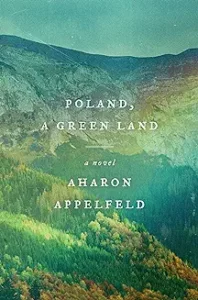Poland, a Green Land novel by the renowned Israeli author Aharon Appelfeld surprisingly reads like a slow burn thriller.
The adult son of Polish-Jewish Holocaust survivors who live in Tel-Aviv, Jakov Fein quixotically decides after their death that he wants to visit the little village they had such fond memories of. That is, memories from before they escaping a gruesome Nazi massacre. You’d be right to wonder why. Fein never felt connected to them and he’s estranged from his wife and two daughters so he’s clearly more than looking for his past: maybe what he learns there can be a guide to his future.
Like a Gothic novel, when he arrives in Krakow and tells people where he’s headed, he’s uniformly warned off: “There’s nothing there.” Even the cart driver taking him there seems to find his mission pointless.
Are they right? Do they mean well?
At first, things seems rosy on the edge of the village. He takes a room in a farmhouse with a welcoming widow, Magda, who lovingly cooks for him, treats him well, and in a major surprise, turns out to have known his family when she was a little girl.
Fein falls in love with his host and in love with the green fields, the woods and the flowing river–all of which seem so different from Israel. He fills in more and more gaps in the lives his parents never quite shared with him, learns family history and seems to be blossoming in some strange way.
But things turn ominous very soon as the locals find out he’s Jewish. They alternate between praise for Israelis as strong and deep-seated antisemitic venom and hatred. He learns a lot, risks a lot, and you wonder if he’ll make it out alive.
The books’ strength is the tension that builds and the way it reads like a novel of suspense as well as some kind of fable. That latter aspect is reinforced by all the times the author describes Fein’s. Sadly, they don’t work: they feel way too long, too specific in detail and dialogue to actually come across as dreams. Some readers may get bored because they slow the narrative way down.
Too often the characters in this book, no matter who they are, speak about Fate, Life, God, Jews, History, Poland, War in almost stilted, oracular fashion and it seems too much like speechifying.
I’ve read many of the late author’s books and if you want to sample him, Badenheim 1939 is truly wonderful. This book doesn’t equal its power and depth.
Lev Raphael is the author of The German Money and twenty-six other books in genres from memoir to mystery.

